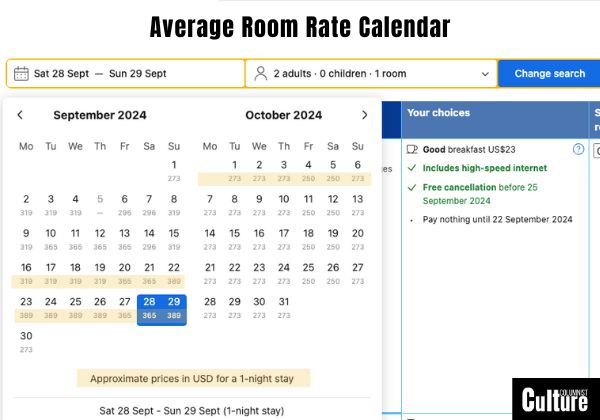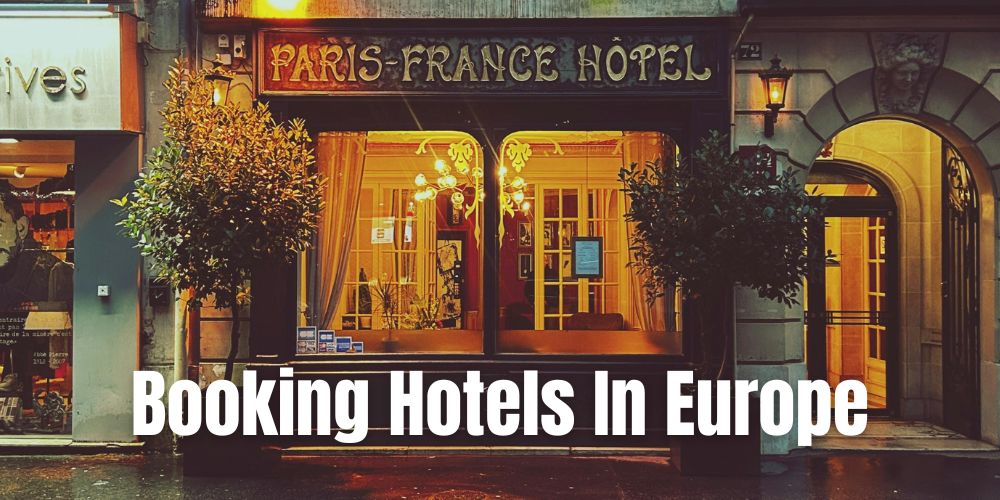How To Book Hotels In Europe
Planning a Europe trip can be an exciting adventure, but as a traveler, one of the most important tasks is securing the right accommodations.
Understanding how to book hotels in Europe is essential to ensuring a comfortable and enjoyable stay.
Whether you’re looking for charming boutique spots or luxury resorts, European hotel options are vast and varied.
This guide will walk you through the ins and outs of booking hotels, offering tips and strategies for making European hotel bookings that suit your style and budget.
From choosing the best Europe hotels to navigating the booking process, we’ve got everything you need to know to make your Europe hotels reservations with confidence.
Step 1: Determine Your Travel Dates
Decide when you’ll be traveling because timing can significantly impact your experience, both in terms of crowds and costs.
If you prefer a quieter, more relaxed atmosphere, consider visiting during the shoulder seasons—spring (April to June) or fall (September to October).

Booking hotels in Europe 2-5 months in advance is sufficient when you’re planning to travel during peak periods or to a popular destination.
Booking hotels in Europe at least 1-3 months in advance is a good safety window for shoulder seasons or less touristy locations.
If you’re not highly particular about the hotel location, quality or price range, it’s still possible to find hotels even under a month in advance on large booking sites like Booking.com or Airbnb.
Step 2: Set a Budget
It’s essential to establish a clear budget for your accommodation because this will help narrow down your options and prevent any surprises later on.
Whether you’re looking for a cheap hotel or a luxury hotel, setting a budget will keep your search focused and efficient.
Use the budget calendar view available on some popular booking sites which provides the estimated average room rates per night for different dates, allowing you to find the best time to book within your budget.

Step 3: Research Location and Proximity to Attractions
In European countries, staying in the heart of a city can offer proximity to key attractions, while choosing a hotel slightly away from the center might give you a different perspective of the country and the culture.
In popular cities like Paris, Rome, and London, staying near the city centre often means you’re within walking distance of the historical old towns, major attractions and landmarks such as the Eiffel Tower or Trafalgar Square allowing you to tour famous sites more easily.
This can help you make the most of your time but city centre hotels can often be more expensive than hotels on the outskirts so it’s essential to weigh their convenience against the higher costs.
Step 4: Compare Hotel Types

A standard European hotel room with a double bed tends to be smaller compared to those in the U.S so be prepared for more compact spaces, especially in older buildings.
If you’re a budget-conscious traveler or looking for a more social experience, a hostel might be ideal, offering shared spaces and affordable rates.
For those seeking more comfort and privacy, consider booking a room in a well-known chain like Radisson Collection Hotel, IHG Hotels, or Radisson Blu Hotel.
Other hotel types in Europe include bed and breakfasts (B&Bs) in UK and Ireland, Paradores (Spain) and Pousadas (Portugal), and agriturismos (working farm stays in Italy where guests can experience rural life).
Step 5: Read Reviews and Ratings
It’s essential to read reviews and check ratings from previous guests, before finalizing your hotel booking.
Platforms like Trip Advisor are invaluable resources, offering insights into quality of service, cleanliness, location, and overall experience, helping you make an informed decision.
Be sure to pay attention to both positive and negative feedback to get a balanced view of what to expect.
Step 6: Compare Hotel Amenities

It’s important to compare the amenities offered by different accommodations to ensure they meet your needs during your Euro trip.
Consider what’s important for your stay—whether it’s an indoor pool for relaxing after a day of sightseeing, complimentary breakfast, fitness facilities, or Wi-Fi access.
Many European hotels, especially in city centers, might not have amenities that you’re used to like air conditioning, elevators, or in-room coffee makers.
Check these details when booking if they are important to you or even filter your search results by amenities to find what you’re looking for.
Step 7: Check Cancellation Policies
Before finalizing your booking, it’s crucial to thoroughly check the hotel’s cancellation policies.
Avoid potential non-refundable fees by looking for options that offer free cancellation, as this gives you flexibility if your plans change unexpectedly.
Purchase good travel insurance to cover any unexpected cancellations or delays, providing you with extra peace of mind during your trip.
Step 8: Look for Deals and Discounts
When booking hotels in Europe, it’s always worth exploring special offers, gift voucher promotions or hotel loyalty programs to make your stay more affordable.
Don’t focus solely on discounted room rates because there are often perks like free night stays, room upgrades, or extra guests that you can make use of.
Many hotels and hotel booking sites also run special offers during off-peak seasons or for longer stays, so take the time to research and compare options to get the best deal possible.

Step 9: Book Directly or Through a Trusted Platform
When it comes to booking hotels in Europe, you have two main options: direct booking with the hotel or using a trusted online platform.
Direct booking can sometimes offer perks like free upgrades, flexible cancellation policies, or added amenities, as hotels often appreciate guests who book directly with them.
On the other hand, platforms like booking.com, hotels.com or agoda.com can provide a wide range of options, competitive prices, and the convenience of comparing multiple hotels in one place.
Step 10: Secure Your Reservation with a Credit Card
If you plan to pay for your reservation upon arrival, double-check that your credit card is accepted in the destination country and that you understand any potential foreign transaction fees.
Many hotels across European countries accept a variety of credit cards, including American Express but be mindful of the currency used in the country you’re visiting to avoid high exchange fees.
For example, in the United Kingdom, including Northern Ireland, the pound is the official currency, while the Czech Republic uses the Czech koruna.
Handy bank travel apps and services like Revolut, Wise, and N26 allow you to instantly exchange money at favorable exchange rates on the go, helping you manage your spending more efficiently.

Step 11: Confirm Your Booking and Save Confirmation Details
Before you embark on your journey, it’s crucial to receive and save your hotel booking confirmation. Double-check the details, including your check-in and check-out dates, room type, and any special requests you may have made.
Once confirmed, save your booking confirmation details in multiple formats—such as a printed copy, an email, and a screenshot on your phone—so you can easily access them if needed and have peace of mind as you travel.
What are some travel tips for European hotels?
There are some particularities that make European hotels different from the US and the rest of the world. Here are a few tips for staying at European hotels:
- Many cities in Europe charge a tourist tax, which is usually not included in the room rate. This tax is often payable upon check-out and varies by city and hotel rating.
- Breakfast is not always included in the room rate, and when it is, it may be a simple continental breakfast.
- European hotels use different electrical outlets (typically Type C or F) and 220-240V power.
- Tipping in European hotels is not as common or expected as it is in the U.S., but it’s appreciated for exceptional service.







